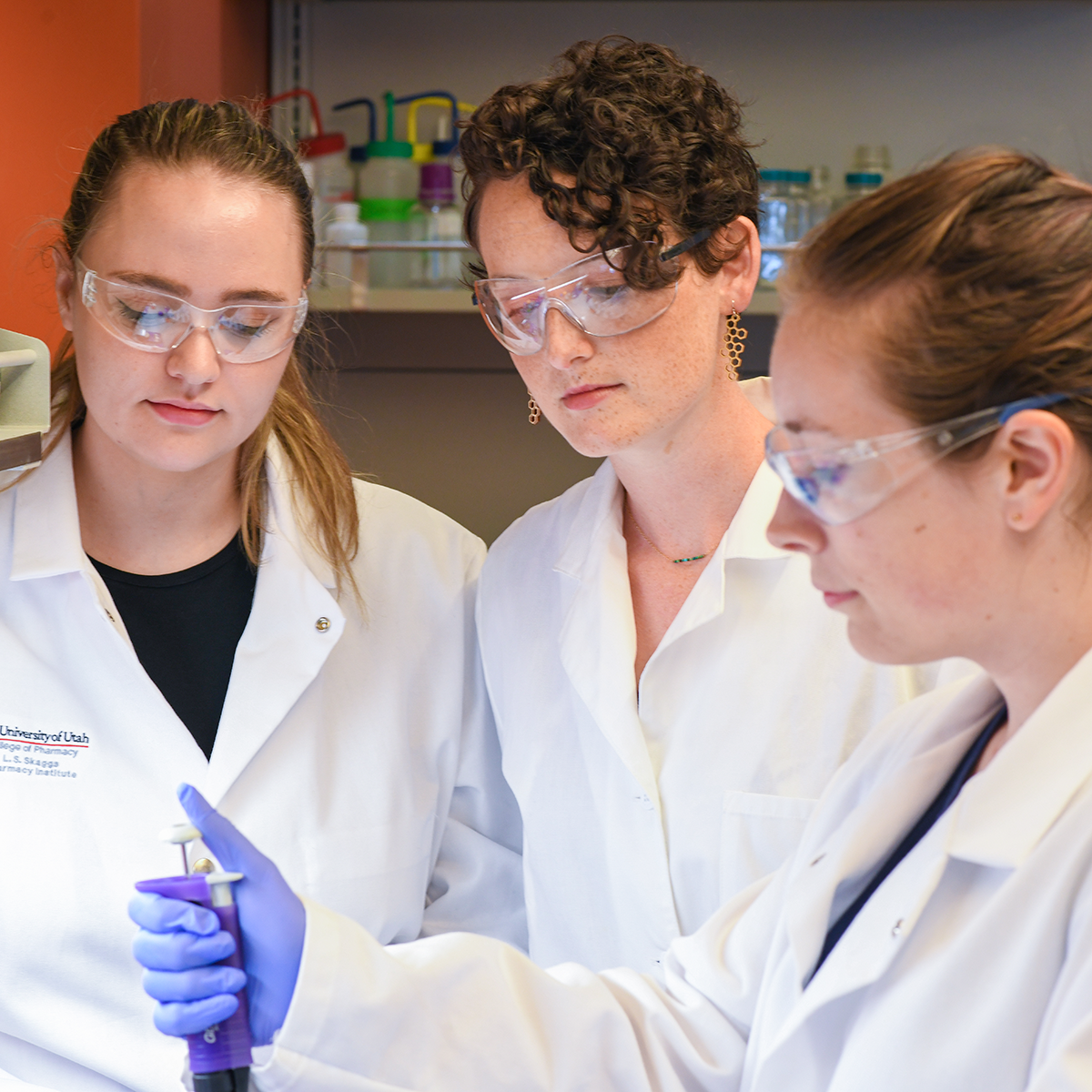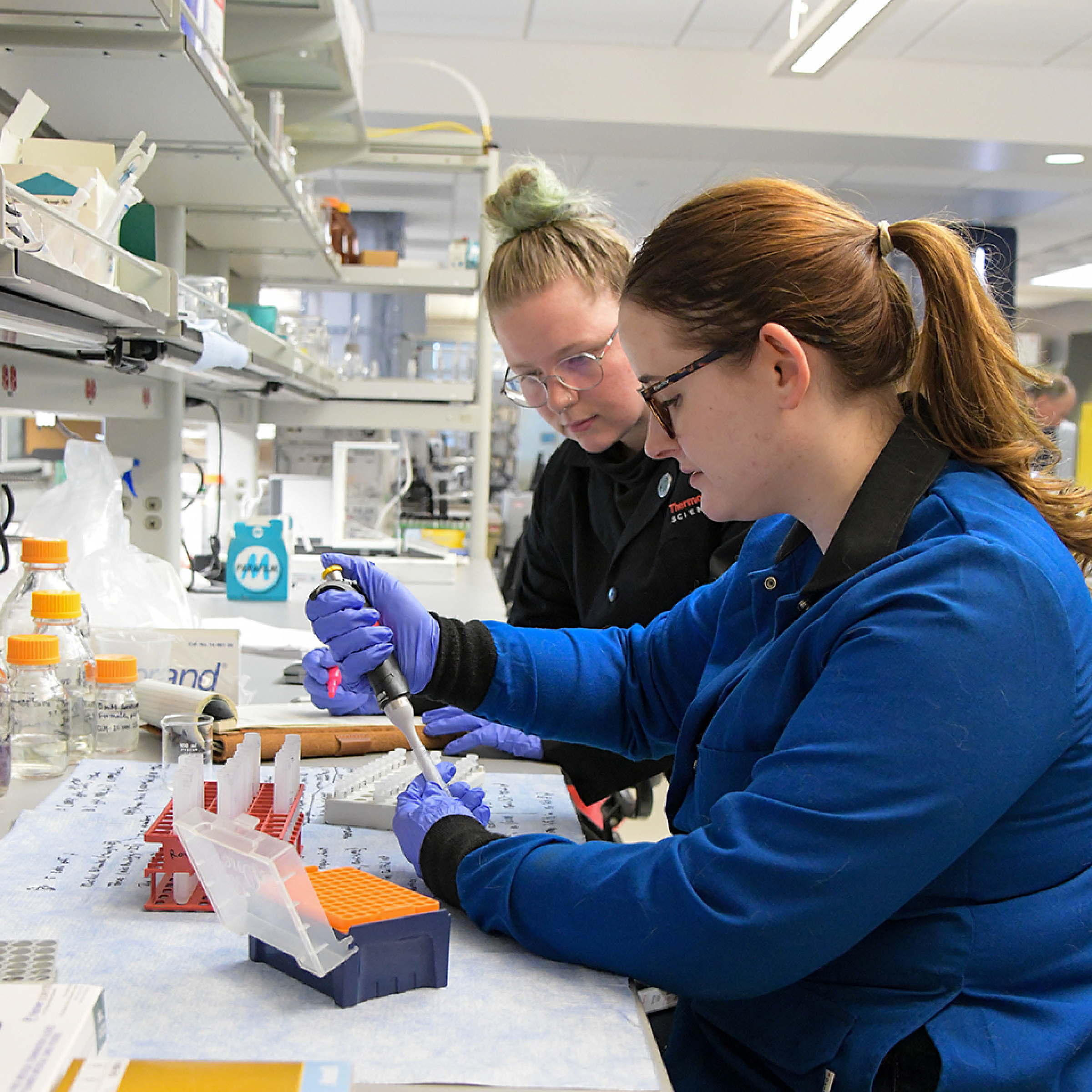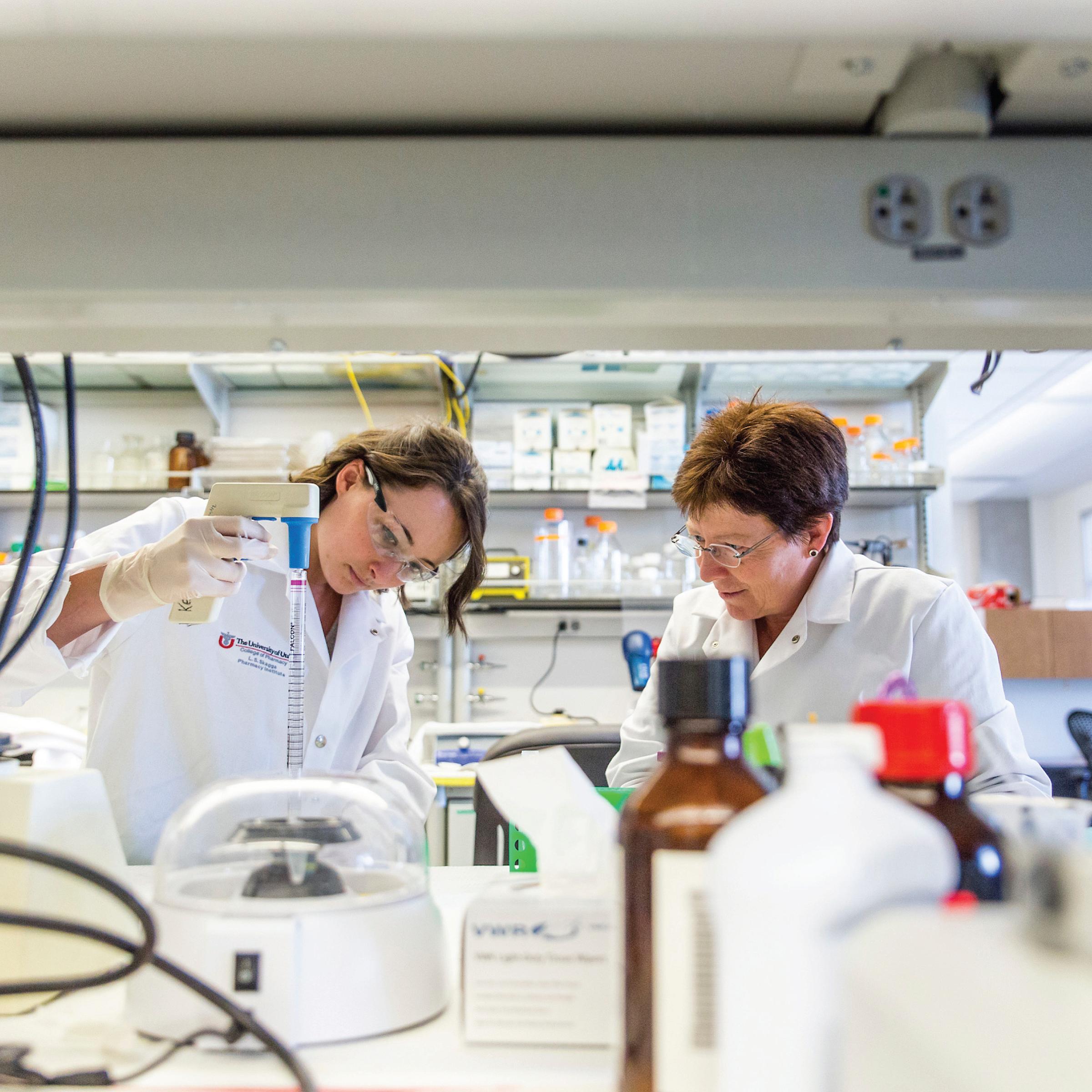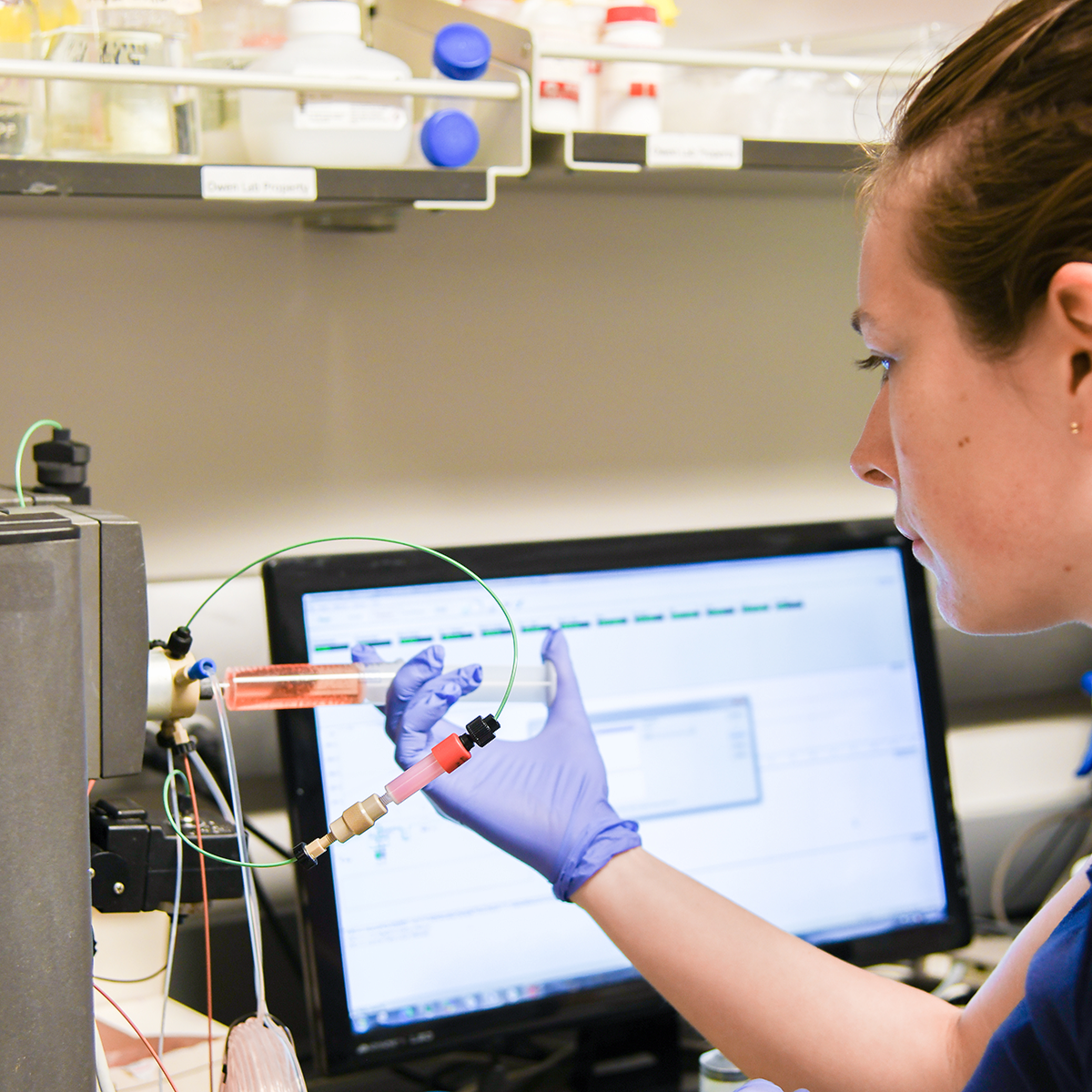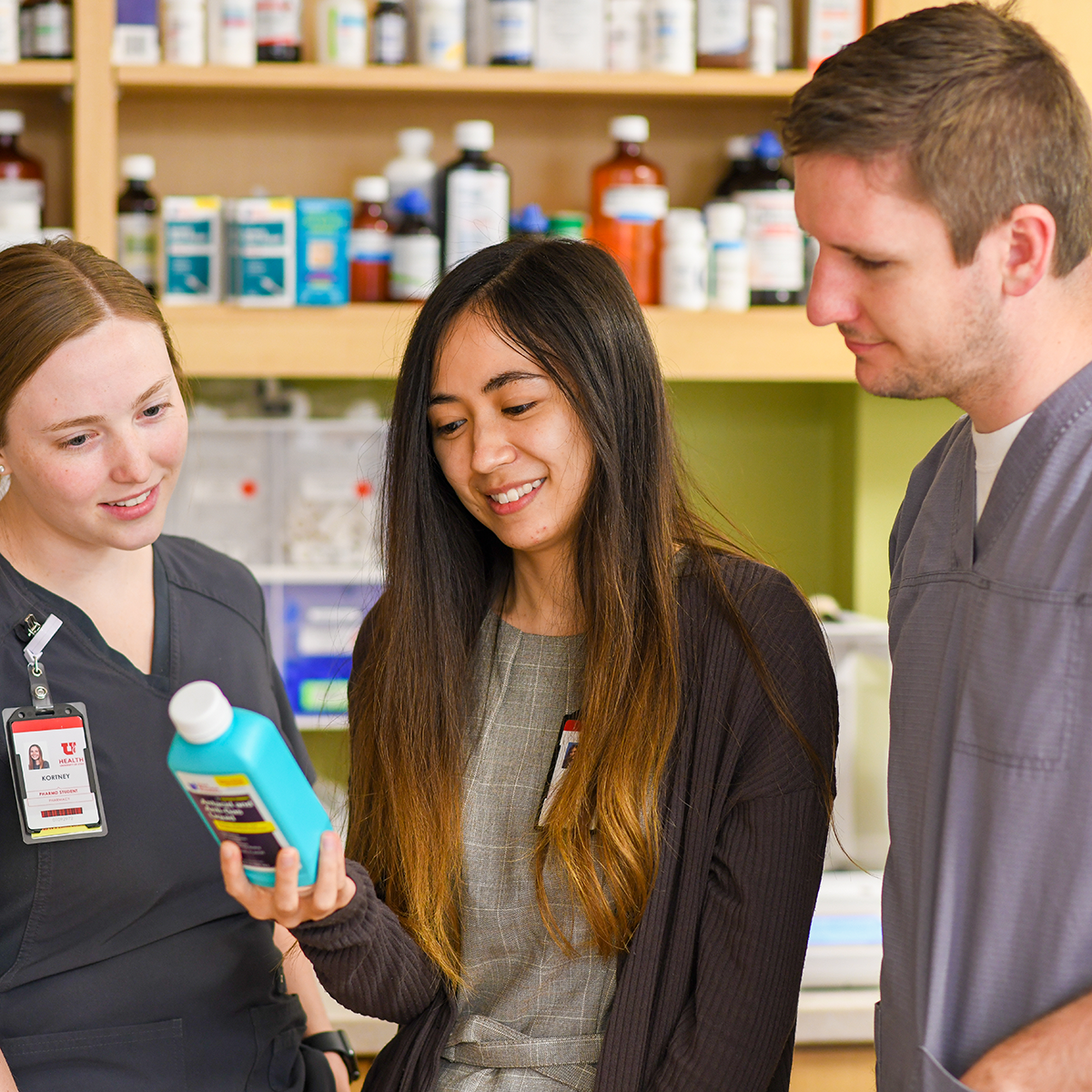Learn more about our Master and PhD programs
The University of Utah College of Pharmacy is part of the University of Utah Health Sciences Center, with state-of-the-art classroom, research and library facilities available to students pursuing graduate education.
The College of Pharmacy at the University of Utah offers an exceptional array of advanced degree programs, including four distinct Ph.D. programs and a Master’s degree, designed to prepare graduates for leadership in the ever-evolving fields of pharmaceutical science. Our departments—Molecular Pharmaceutics, Pharmacology and Toxicology, Medicinal Chemistry, and Pharmacotherapy—each offer a Ph.D. program through the University’s Graduate School.
These programs are tailored to cultivate the skills necessary for students to thrive independently and excel across diverse career paths. Whether aspiring to impact academia, regulatory agencies, business management, or scientific research, our students gain a strong foundation through a blend of formal coursework, research seminars, and specialized journal clubs.
Our Ph.D. students benefit from a well-structured curriculum that includes lab rotations and in-depth dissertation research under the mentorship of experienced faculty. We emphasize a supportive and collaborative environment, encouraging students to complete their Ph.D. programs within five years, although some may require additional time to fulfill the unique demands of their research projects. Additionally, the Department of Pharmacology and Toxicology offers a Master’s degree program, focusing on rigorous academic and practical training to prepare graduates for professional success in scientific and clinical settings.
Graduate Programs
The University of Utah College of Pharmacy is part of the University of Utah Health Sciences Center, with state-of-the-art classroom, research and library facilities available to students pursuing graduate education. The Department of Pharmacotherapy has a long, rich history in the provision of high quality post-graduate training for pharmacy practitioners and outcomes researchers. Students in the Doctor of Philosophy in Pharmacotherapy Outcomes Research Program are highly motivated with backgrounds in a pharmacy and pharmaceutical sciences, health economics, or other healthcare field.
Students graduate with core competencies in health economics, epidemiology, research design, and statistics. They are also prepared to be independent outcomes researchers trained to generate evidence to support health policy decisions regarding pharmaceuticals and related technologies. Graduates of our program currently apply these sills in a broad range of career settings including the pharmaceutical industry, academia, institutional pharmacy, community pharmacy, and managed care organizations.
We require a statement of purpose, CV, transcripts, score reports (GRE for US applicants and GRE and TOEFL for International applicants) and three letters of recommendation from all applicants.
The Department of Medicinal Chemistry together with the Dean's Office have developed a pathway for students who are interested in simultaneously pursuing a Pharm.D and a Ph.D. in Medicinal Chemistry. This program is intended for students who are interested in a career in basic or clinical research for the discovery and development of new pharmaceutical therapies. It is constructed to intersperse the core curriculum requirements of the Ph.D. program into the curriculum of the Pharm.D. program, making course substitutions where feasible. In doing this, we minimize curriculum redundancy between the two programs while ensuring that the student is adequately prepared for the demands of both degree programs.
During the joint program pathway, students undertake research in the summers between their P1-P3 years. Students are also expected to use at least one clerkship rotation for research. The program is structured so that students can take their Ph.D. qualification exams during their P5 year and their pharmacy licensure exam at the normal time after completion of the P4 year. Following P4 year, the students engage in full time research to complete the Ph.D. program.
Students who are interested in pursuing this pathway should apply to the Pharm.D. program first. Students are accepted into the Ph.D. program during their P1 year if the student meets the program admissions criteria and there is appropriate research mentoring and support for the student. Interested students should contact the Director of Graduate Admissions in the Department of Medicinal Chemistry for application procedures and information.
The Graduate Program in the Department of Pharmacology and Toxicology at the University of Utah offers training for the Ph.D. degree. Since 1948, more than two hundred individuals have been trained by this program. Our graduate students (see current graduate students page) hail from all regions of the country, and enjoy close working relationships with their faculty mentors, rich and diverse research opportunities, and flexible programs of study based on their individual needs and interests. Students gain didactic teaching and public speaking experience by participating in our professional teaching, journal club and seminar programs.
Students generally enter the PhD Program in Pharmacology and Toxicology through the Bioscience PhD Programs of Biological Chemistry or Molecular Biology www.bioscience.utah.edu . or via the Interdepartmental Program in Neuroscience www.neuroscience.med.utah.edu .
The Department of Molecular Pharmaceutics offers a Ph.D. degree program through the Graduate School of the University of Utah. The program seeks to prepare graduate students to function independently, competently and technically in a variety of settings including academic, research, administrative, business management, legal, regulatory and investment career tracks. This goal is accomplished through formal didactic courses, seminars and journal clubs, laboratory research rotations, and dissertation research. Every attempt is made by the faculty to help the student complete the program in a timely fashion. Typically, students graduate within 5 years of entering the program, although the nature of some projects and approaches requires a longer time commitment for full completion of the dissertation work.
The Pharmacology and Toxicology Department will be accepting applications for a Master's Program in Fall 2024. The PHTX-MS Program will start in the Fall of 2025.
This 1 year program will include two tracks: a Laboratory Research Track and a Capstone Track.
- The Laboratory Research Track will include required coursework, a research project, and related thesis defense in front of a committee.
- The Capstone Track will focus on coursework and a literature review, from which students will present and defend a thesis.
The PHTX-MS students will take courses, work in laboratories, and participate in professional development activities alongside current PhD students.
